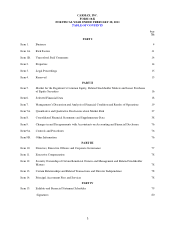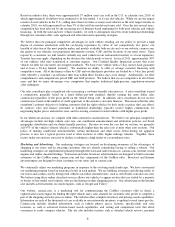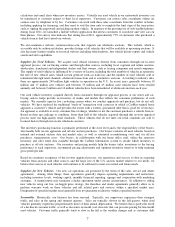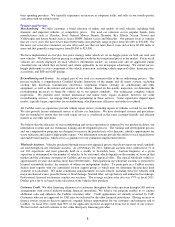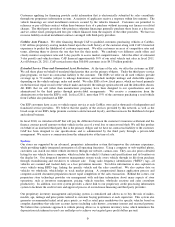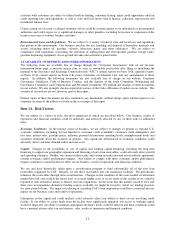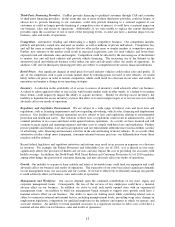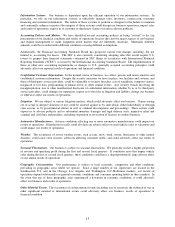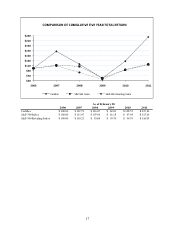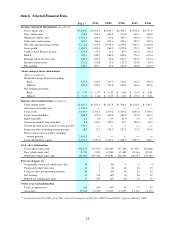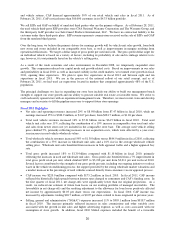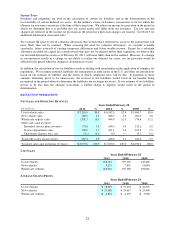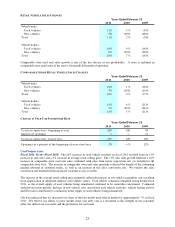CarMax 2011 Annual Report Download - page 23
Download and view the complete annual report
Please find page 23 of the 2011 CarMax annual report below. You can navigate through the pages in the report by either clicking on the pages listed below, or by using the keyword search tool below to find specific information within the annual report.13
Information Systems. Our business is dependent upon the efficient operation of our information systems. In
particular, we rely on our information systems to effectively manage sales, inventory, carmax.com, consumer
financing and customer information. The failure of these systems to perform as designed or the failure to maintain
and continually enhance or protect the integrity of these systems could disrupt our business operations, impact sales
and results of operations, expose us to customer or third-party claims or result in adverse publicity.
Accounting Policies and Matters. We have identified several accounting policies as being “critical” to the fair
presentation of our financial condition and results of operations because they involve major aspects of our business
and require management to make judgments about matters that are inherently uncertain. Materially different
amounts could be recorded under different conditions or using different assumptions.
Additionally, the Financial Accounting Standards Board has proposed various rule changes including, but not
limited to, accounting for leases. The SEC is also currently considering adopting rules that would require U.S.
issuers to prepare their financial statements contained in SEC filings in accordance with International Financial
Reporting Standards (“IFRS”), as issued by the International Accounting Standards Board. The implementation of
these or other new accounting requirements or changes to U.S. generally accepted accounting principles could
adversely affect our reported results of operations and financial condition.
Confidential Customer Information. In the normal course of business, we collect, process and retain sensitive and
confidential customer information. Despite the security measures we have in place, our facilities and systems, and
those of third-party service providers, could be vulnerable to security breaches, acts of vandalism, computer viruses,
misplaced or lost data, programming or human errors or other similar events. Any security breach involving the
misappropriation, loss or other unauthorized disclosure of confidential information, whether by us or by third-party
service providers, could damage our reputation, expose us to the risks of litigation and liability, disrupt our business
or otherwise affect our results of operations.
Litigation. We are subject to various litigation matters, which could adversely affect our business. Claims arising
out of actual or alleged violations of law could be asserted against us by individuals, either individually or through
class actions, or by governmental entities in civil or criminal investigations and proceedings. These actions could
expose us to adverse publicity and to substantial monetary damages and legal defense costs, injunctive relief and
criminal and civil fines and penalties, including suspension or revocation of licenses to conduct business.
Automotive Manufacturers. Adverse conditions affecting one or more automotive manufacturers could impact our
results of operations. Manufacturer recalls could also have an adverse effect on used vehicle sales or valuations and
could impact our results of operations.
Weather. The occurrence of severe weather events, such as rain, snow, wind, storms, hurricanes or other natural
disasters, could cause store closures, adversely affecting consumer traffic, and could adversely affect our results of
operations.
Seasonal Fluctuations. Our business is subject to seasonal fluctuations. We generally realize a higher proportion
of revenue and operating profit during the first and second fiscal quarters. If conditions arise that impair vehicle
sales during the first or second fiscal quarters, these conditions could have a disproportionately large adverse effect
on our annual results of operations.
Geographic Concentration. Our performance is subject to local economic, competitive and other conditions
prevailing in geographic areas where we operate. Since a large number of our superstores are located in the
Southeastern U.S. and in the Chicago, Los Angeles and Washington, D.C./Baltimore markets, our results of
operations depend substantially on general economic conditions and consumer spending habits in these markets. In
the event that any of these geographic areas experienced a downturn in economic conditions, it could adversely
affect our business and results of operations.
Other Material Events. The occurrence of certain material events including acts of terrorism, the outbreak of war or
other significant national or international events could adversely affect our business, results of operations or
financial condition.


